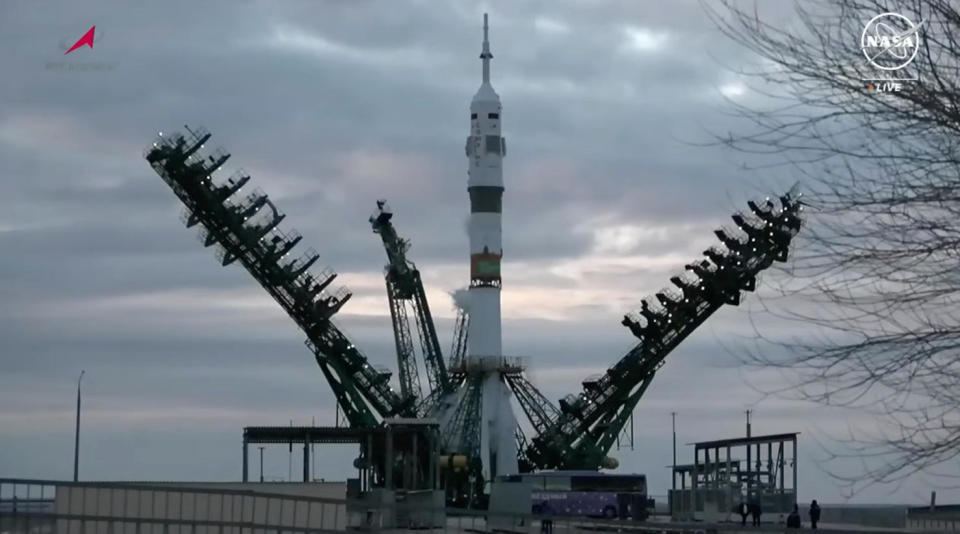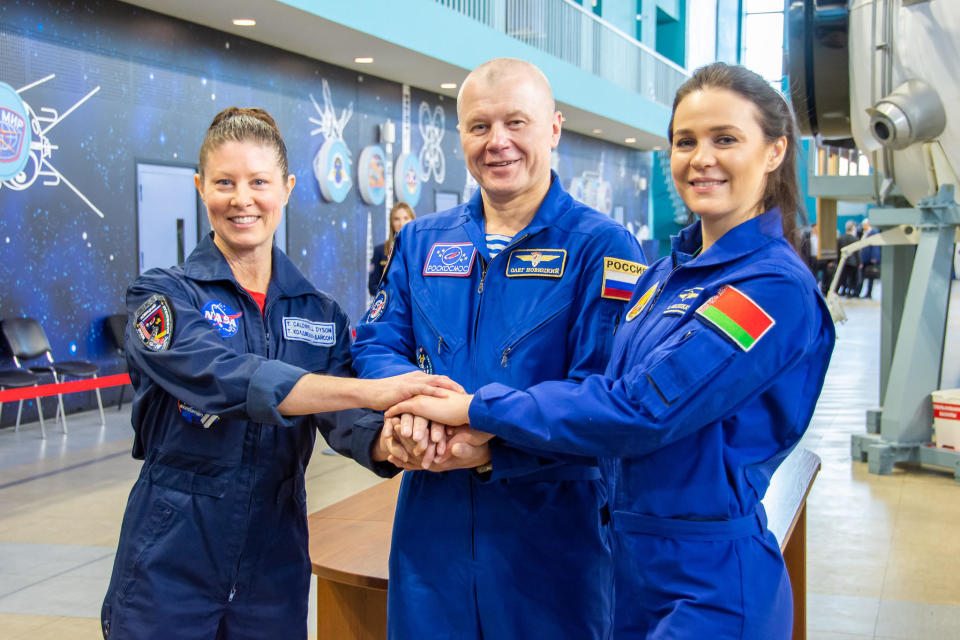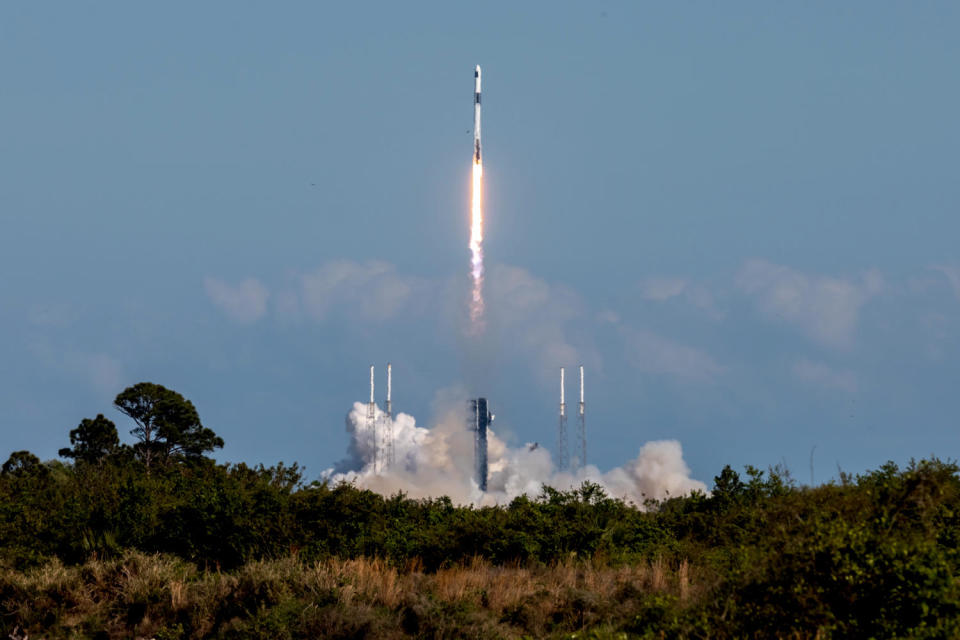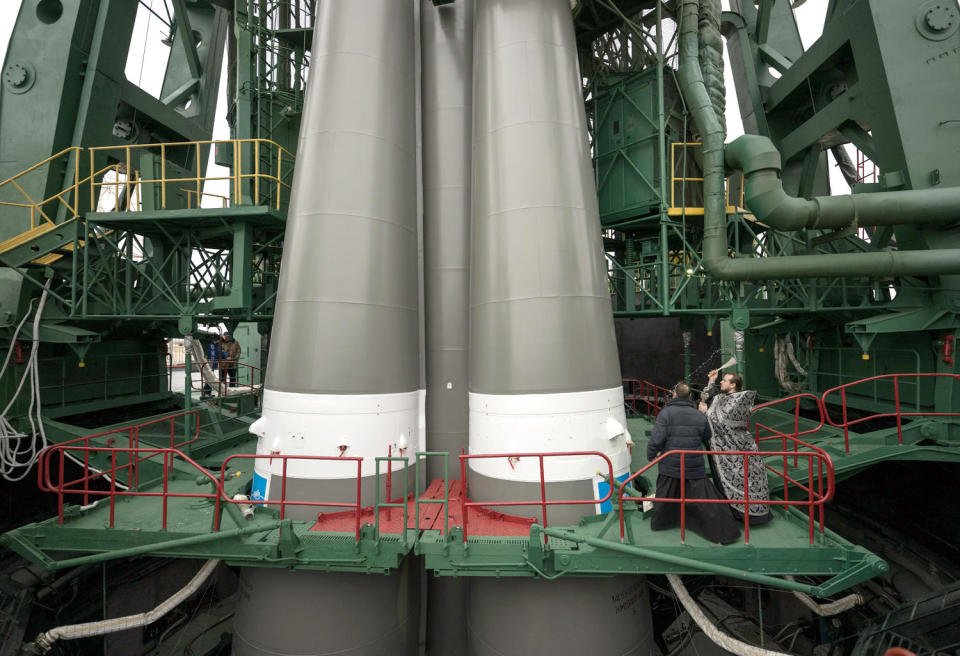Russia's Soyuz launch to space station aborted at last minute in rare delay
- Oops!Something went wrong.Please try again later.
- Oops!Something went wrong.Please try again later.
- Oops!Something went wrong.Please try again later.
- Oops!Something went wrong.Please try again later.
Launch of a Russian Soyuz rocket carrying a cosmonaut commander, a guest flier from Belarus and NASA astronaut Tracy Dyson was aborted at the T-minus 20-second mark Thursday, delaying the crew's planned flight to the International Space Station.
With veteran commander Oleg Novitskiy at the controls, flanked on the left by Belarus spaceflight participant Marina Vasilevskaya and on the right by Dyson, the countdown was ticking smoothly toward liftoff at 9:21 a.m. EDT when an unidentified controller called an abort.

No explanation was immediately provided, but NASA's launch commentator said the crew was safe and the vehicle was in a stable configuration. Ground crews quickly regained access to help Novitskiy, Vasilevskaya and Dyson out of the Soyuz MS-25/71S spacecraft.
Based on the space station's orbit, the next launch opportunity is Saturday morning, setting up a docking at the lab complex Monday. But that will depend on exactly what went wrong and what might be required to fix it. As of Thursday afternoon, no decisions had been made.
But one thing was clear. Flight controllers in Houston told the space station crew "it's going to be a few days before you guys have visitors up there."

In the meantime, SpaceX engineers pressed ahead with launch of a Falcon 9 rocket from the Cape Canaveral Space Force Station at 4:55 p.m., sending a Dragon cargo ship on a 38-hour flight to deliver 6,200 pounds of science gear, spare parts and crew supplies to the space station.
The flight plan calls for the Cargo Dragon to catch up with the lab and move in for docking around 7:30 a.m. Saturday. Whether countdown clocks at the Baikonur Cosmodrome will be ticking toward a second Soyuz launch attempt is not yet know. But if the flight proceeds, liftoff would be expected at 8:36 a.m.

Whenever they arrive, Novitskiy, Vasilevskaya and Dyson will be joining ISS commander Oleg Kononenko, cosmonauts Nikolai Chub and Alexander Grebenkin and NASA astronauts Loral O'Hara, Matthew Dominick, Michael Barratt and Jeanette Epps.
Vasilevskaya, an accomplished ballroom dancer and flight attendant with Belavia Airlines, is the first citizen of Belarus, a staunch ally of Russia, to be named to a spaceflight since the breakup of the Soviet Union. She was selected as a "spaceflight participant" in a nationwide competition and will conduct research for scientists in Belarus.

"I'm so proud to represent our republic, I'm so proud we have this project," she said before boarding the Soyuz for launch."
Dyson is making her third spaceflight and her second aboard a Soyuz. Despite tension between the United States and Russia, the crew appears to get along well together.
"It's actually been a real delight working with Marina," Dyson said. "She's got a fantastic attitude, and that goes a long way when you're working together with emergency masks on your face in awful conditions trying to get through (emergency training) procedures. She's been a real delight to work with."
Kononenko, Chub and O'Hara were launched to the station last Sept. 15 aboard the Soyuz MS-24/70S spacecraft. Dominick, Barratt, Epps and Grebenkin were launched on March 3 aboard a SpaceX Crew Dragon ferry ship. Known as Crew 8, they replaced four other Crew Dragon fliers — Crew 7 — who returned to Earth on March 12 after a short handover.
Novitskiy and Vasilevskaya plan to spend 12 days aboard the space station. O'Hara will replace Dyson for the trip home and the trio will return to Earth aboard the Soyuz MS-24/70S spacecraft that carried O'Hara, Kononenko and Chub into orbit last September.
Kononenko and Chub are midway through a planned yearlong stay aboard the station. If all goes well, they will return to Earth next September, along with Dyson, using the Soyuz MS-25/71S ferry ship delivered by Novitskiy's crew. With O'Hara's return, the latest crew rotation sequence will be complete.
The Right To Be Wrong I Sunday on 60 Minutes

